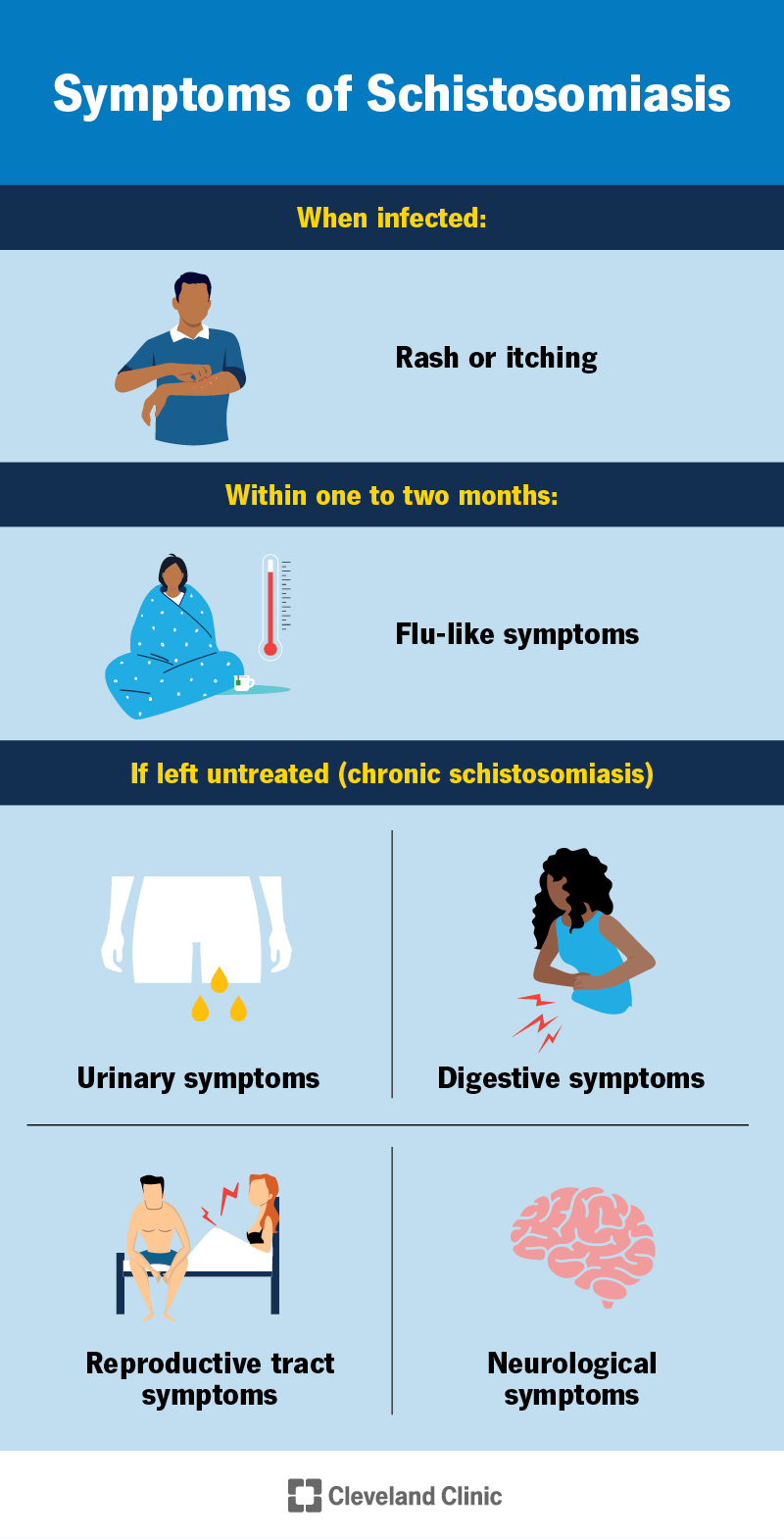Schistosomiasis is an infection with the parasitic worm Schistosoma. You get it from contact with freshwater sources that have the parasite in them. This includes swimming in or drinking the contaminated water, or using it for laundry. It’s mostly found in parts of Africa. It can lead to organ damage if left untreated.
Advertisement
Cleveland Clinic is a non-profit academic medical center. Advertising on our site helps support our mission. We do not endorse non-Cleveland Clinic products or services. Policy

Image content: This image is available to view online.
View image online (https://my.clevelandclinic.org/-/scassets/images/org/health/articles/schistomiasis)
Schistosomiasis is an infection with the parasitic worm Schistosoma. The worm enters your body through your skin and can spread through your blood to other parts of your body. If you don’t treat the infection, it can damage your organs. You get it from contact with freshwater — like rivers, lakes and creeks — that contain the snails that carry it. Schistosomiasis is also called bilharzia.
Advertisement
Cleveland Clinic is a non-profit academic medical center. Advertising on our site helps support our mission. We do not endorse non-Cleveland Clinic products or services. Policy
It takes a while for symptoms of schistosomiasis to show up. The only symptom you might notice right away is itching or a rash where the worm entered your skin. You might have flu-like symptoms a few weeks or months after getting infected. These include:
These symptoms often go away on their own. If the worms spread to your organs, you might develop additional symptoms months later. These include:
Rarely, some people develop neurological symptoms. These include seizures, severe headaches, vision problems and difficulty walking.
Schistosoma, a type of parasitic worm, causes schistosomiasis. There are many species of Schistosoma that can infect humans. When someone with a Schistosoma infection poops or pees in water, the parasite eggs are released.
The eggs hatch, and the larvae infect freshwater snails to reproduce. Then, they’re released from the snails into the water. From there, they enter your body through your skin.
Advertisement
You can get infected when you’re exposed to contaminated water, like:
People without access to clean, running water and toilet facilities are at the highest risk.
No, it’s not contagious. The Schistosoma larvae need snails to continue their life cycle. They can’t spread from person to person.
The parasites that cause schistosomiasis are found in many areas of the world, including parts of:
If left untreated, schistosomiasis can spread from your blood to other parts of your body, causing:
Repeated infections can cause anemia, malnutrition and developmental issues. Scarring and inflammation of your bladder can eventually lead to bladder cancer.
Healthcare providers diagnose schistosomiasis by looking for parasite eggs in your pee or poop. They might also do blood tests. Make sure you let your provider know if you’ve traveled anywhere or think you could’ve been exposed to Schistosoma. It takes a few weeks after exposure to Schistosoma to test positive for infection.
Yes, schistosomiasis can completely go away with treatment. Healthcare providers treat it with the antibiotic praziquantel. You take two to three doses for a day or two. You may have to take additional doses a few weeks after the first treatment to get rid of it entirely.
Talk to a healthcare provider if you’ve been exposed to water that could have Schistosoma in it, especially if you develop flu-like symptoms weeks later. They can test you for an infection a few weeks after exposure. Early treatment can kill the infection before it spreads.
Schistosomiasis is treatable. But it’s best to catch and treat it early, before it spreads. Even with treatment, organ damage can be permanent.
One recent study suggests that the life expectancy of someone with advanced schistosomiasis is around 50 years. The study was done in an area where schistosomiasis is common.
You can reduce your risk of schistosomiasis by:
Access to clean water and antiparasitic medications can help prevent schistosomiasis in areas where it commonly spreads.
Advertisement
Many people love a refreshing dip in a river or lake. Unfortunately, Schistosoma parasites like to spend time there, too. But schistosomiasis is curable and shouldn’t spread to other parts of your body if caught early. Talk to your provider if you’ve been in an area where you could’ve been exposed.
Advertisement

Sign up for our Health Essentials emails for expert guidance on nutrition, fitness, sleep, skin care and more.
Learn more about the Health Library and our editorial process.
Cleveland Clinic’s health articles are based on evidence-backed information and review by medical professionals to ensure accuracy, reliability and up-to-date clinical standards.
Cleveland Clinic’s health articles are based on evidence-backed information and review by medical professionals to ensure accuracy, reliability and up-to-date clinical standards.
Have a virus, fungus or bacteria? Some of these “bugs” won’t go away on their own. Cleveland Clinic’s infectious disease experts are here to help.
